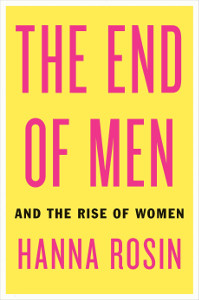Difference between revisions of "The End of Men (book)"
Jump to navigation
Jump to search
| (7 intermediate revisions by the same user not shown) | |||
| Line 1: | Line 1: | ||
| + | [[File:The_End_of_Men_(Rosin_book).jpg|thumb]] |
||
| ⚫ | |||
| − | The |
+ | '''The End of Men''' is the highly [[misandrist]] title of a book by [[Hanna Rosin]].<ref> http://hannarosin.com/the-end-of-men/</ref><ref>https://archive.is/rxTxY</ref> |
| + | |||
| ⚫ | The book uses anecdotes and qualitative reports to posit a fundamental shift towards female social, political and economic dominance in the modern would. The evidence presented in the book has been widely debunked, including by a detailed critique from Boston University.<ref>http://www.bu.edu/bulawreview/files/2013/08/COHEN.pdf</ref> |
||
| + | |||
| + | The book was based on an earlier article published in The Atlantic.<ref>https://www.theatlantic.com/magazine/archive/2010/07/the-end-of-men/308135/</ref><ref>https://archive.ph/fZ2L1</ref> |
||
== See Also == |
== See Also == |
||
| − | * |
+ | *[[Men are Obsolete]] |
| + | *[[The End of Men (documentary)]] |
||
== External Link == |
== External Link == |
||
| − | *[https://www.theatlantic.com/magazine/archive/2010/07/the-end-of-men/308135/ The End of Men, in The Atlantic] |
+ | *[https://www.theatlantic.com/magazine/archive/2010/07/the-end-of-men/308135/ The End of Men, in The Atlantic]<ref>https://archive.is/TiJn</ref> |
*[http://www.bu.edu/bulawreview/files/2013/08/COHEN.pdf Critique of The End of Men from Boston University] |
*[http://www.bu.edu/bulawreview/files/2013/08/COHEN.pdf Critique of The End of Men from Boston University] |
||
| Line 16: | Line 21: | ||
[[Category: Books]] |
[[Category: Books]] |
||
[[Category: Featured Articles]] |
[[Category: Featured Articles]] |
||
| + | [[Category: Misandry]] |
||
Latest revision as of 09:07, 1 November 2024
The End of Men is the highly misandrist title of a book by Hanna Rosin.[1][2]
The book uses anecdotes and qualitative reports to posit a fundamental shift towards female social, political and economic dominance in the modern would. The evidence presented in the book has been widely debunked, including by a detailed critique from Boston University.[3]
The book was based on an earlier article published in The Atlantic.[4][5]
